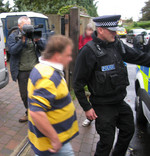
Liam Vernon, deputy dead of the UK Human Trafficking Centre (UKHTC) at the Serious Organised Crime Agency (SOCA), made the claim after two people were arrested by Kent Police in a dawn raid on a property in Maidstone last Friday.
“We suspect the people arrested were involved in the trafficking of Lithuanian men into the UK for exploitation within the food industry,” said Vernon.
A 52-year-old man and a woman aged 50 were arrested as part of an investigation into workers who were allegedly forced to live in squalid conditions and threatened with violence if they did not comply with their supervisor’s instructions.
The operation was led by Kent Police working in partnership with the Gangmaster Licensing Authority (GLA) and UKHTC.
Forced to work
Detective inspector Keith Roberts said: “These arrests form part of an extensive investigation by Kent Police, the GLA and UKHTC. It follows on from reports received that migrant workers have been made to live in poor conditions and forced to work in an environment that gave little or no regard to their safety or general wellbeing.”
He added: “It’s alleged that the men, who have received specialist care and support from SOCA’s Vulnerable Persons Team and the Salvation Army, were subjected to slave-like conditions and controlled through the use of violence.”
At least 29 men from Lithuania were identified as potential victims of human trafficking. They were referred to the National Referral Mechanism − a mechanism for identifying victims of human trafficking and ensuring people receive appropriate protection and support.
Chicken catchers
The men were allegedly forced to work as chicken catchers for the food industry.
Investigating trafficking for labour exploitation is a challenge because victims are kept locked away and unseen by society, according to UKHTC. “Last year 461 adult and child victims were encountered by frontline professionals and reported to the centre. They were being used for their labour in many different ways, all for the financial gain of the traffickers,” it said.
Vernon pledged to work with related organisations to bring offenders to justice and protect vulnerable members of our society. “I urge anybody with information that can lead to the identification and rescue of a victim of trafficking to share it with the police,” he said.
Major Anne Read, The Salvation Army's anti-trafficking response co-ordinator, said her organisation was working with Kent Police and SOCA's team to support suspected victims of trafficking.
“It is vital that the men receive immediate access to specialised support and counselling,” she said. “We have a special team ready to support them and ensure they have access to emergency accommodation at safe houses. The government has awarded the Salvation Army £2M a year to provide vital help and support to victims of this exploitation.”
Meanwhile, in May, a report published by the Joseph Rowntree Foundation claimed migrant workers in the food manufacturing sector suffered widespread abuse.





